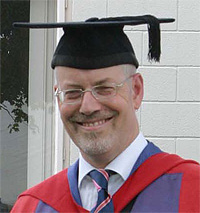Mark Harrison - Distinguished Visiting Fellow
 Professor Mark Harrison, Head of the Department of Economics, has been reappointed as a one of only a dozen Distinguished Visiting Fellows of the Hoover Institution, Stanford.
Professor Mark Harrison, Head of the Department of Economics, has been reappointed as a one of only a dozen Distinguished Visiting Fellows of the Hoover Institution, Stanford.
Other Distinguished Visiting Fellows include Mark's collaborator Paul Gregory, the historian Bob Service, Ed Meese (Reagan's attorney general) and U.S. congressman Newt Gingrich.
The Hoover Institution on War, Revolution and Peace, Stanford University, is a public policy research center devoted to advanced study of politics, economics, and political economy—both domestic and foreign—as well as international affairs. With its world-renowned group of scholars and ongoing programs of policy-oriented research, the Hoover Institution puts its accumulated knowledge to work as a prominent contributor to the world marketplace of ideas defining a free society.
Mark is currently working on the Hoover Russian Archives Research Project led by Hoover research fellow Paul R. Gregory.
Mark was one of the first economists to begin research in the Russian state archives following the fall of communism in the Soviet Union. His work in the Russian archives began with making new estimates of the real changes in the Soviet economy during World War II and of the burdens and costs arising from the war. Since then he has worked on various aspects of Soviet national economic planning, economic statistics, and the management of defense production and research and development. He studied in Moscow in the early 1970s and has subsequently visited the Soviet Union on many occasions. He has also worked to bring new knowledge about the Russian and Soviet economy into mainstream comparative economics and economic history, especially through projects on the two world wars. He edits the Political Economy Research in Soviet Archives (PERSA) working papers at www.warwick.ac.uk/go/persa.
His work has had some notable results. His research on the two world wars has shown that richer market economies had a significant advantage when it came to economic mobilization. Much of this advantage flowed from greater liberalization: prewar efforts to protect jobs or safeguard "food security" were generally counterproductive. Poor economies, especially those with a large peasant population, tended to collapse under the stress of total war. The exception is Stalin's Soviet Union, which was able to carry a disproportionate wartime economic burden.
Mark's research on the microeconomics of the Soviet command system has opened up subjects such as military research and secrecy, previously thought of as ruled by politics, to economic analysis. His work on hidden inflation has helped rewrite the theory of the Soviet state-owned enterprise. Finally, his research on terrorism has shown that citizens' responses can play an important role in reducing casualties from suicide attacks. He is continuing to work on the political economy of the command system with the Hoover group.
In addition to his Warwick and Hoover appointments Mark is also senior research fellow at the Centre for Russian and East European Studies, University of Birmingham.
For further information see Mark's homepage at http://www2.warwick.ac.uk/fac/soc/economics/staff/faculty/harrison/
